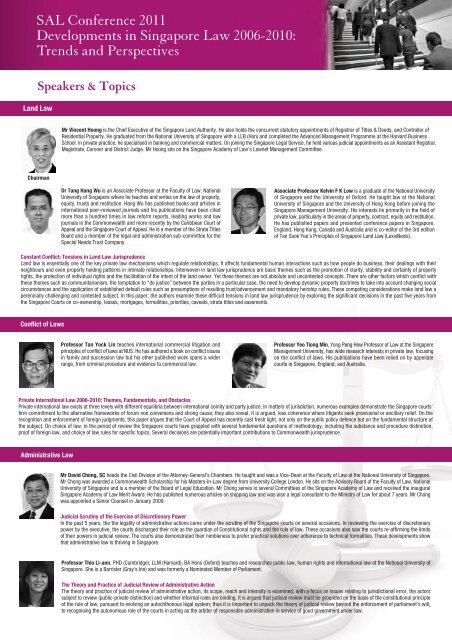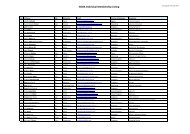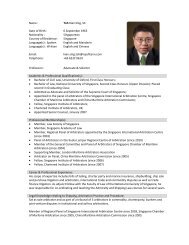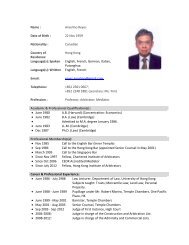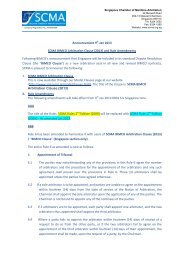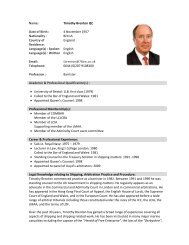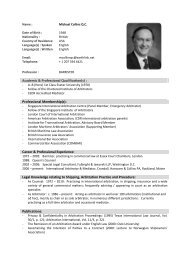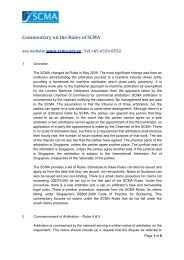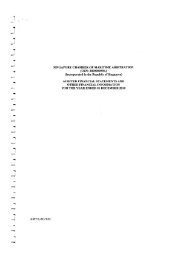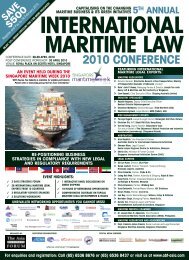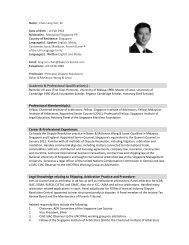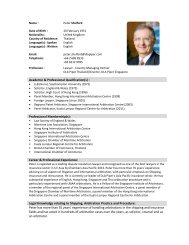here - SCMA
here - SCMA
here - SCMA
Create successful ePaper yourself
Turn your PDF publications into a flip-book with our unique Google optimized e-Paper software.
SAL Conference 2011<br />
Developments in Singapore Law 2006-2010:<br />
Trends and Perspectives<br />
Speakers & Topics<br />
Land Law<br />
Mr Vincent Hoong is the Chief Executive of the Singapore Land Authority. He also holds the concurrent statutory appointments of Registrar of Titles & Deeds, and Controller of<br />
Residential Property. He graduated from the National University of Singapore with a LLB (Hon) and completed the Advanced Management Programme at the Harvard Business<br />
School. In private practice, he specialised in banking and commercial matters. On joining the Singapore Legal Service, he held various judicial appointments as an Assistant Registrar,<br />
Magistrate, Coroner and District Judge. Mr Hoong sits on the Singapore Academy of Law’s Lawnet Management Committee.<br />
Chairman<br />
Dr Tang Hang Wu is an Associate Professor at the Faculty of Law, National<br />
University of Singapore w<strong>here</strong> he teaches and writes on the law of property,<br />
equity, trusts and restitution. Hang Wu has published books and articles in<br />
international peer-reviewed journals and his publications have been cited<br />
more than a hundred times in law reform reports, leading works and law<br />
journals in the Commonwealth and more recently by the Caribbean Court of<br />
Appeal and the Singapore Court of Appeal. He is a member of the Strata Titles<br />
Board and a member of the legal and administration sub-committee for the<br />
Special Needs Trust Company.<br />
Associate Professor Kelvin F K Low is a graduate of the National University<br />
of Singapore and the University of Oxford. He taught law at the National<br />
University of Singapore and the University of Hong Kong before joining the<br />
Singapore Management University. His interests lie primarily in the field of<br />
private law, particularly in the areas of property, contract, equity and restitution.<br />
He has published papers and presented conference papers in Singapore,<br />
England, Hong Kong, Canada and Australia and is co-editor of the 3rd edition<br />
of Tan Sook Yee’s Principles of Singapore Land Law (LexisNexis).<br />
Constant Conflict: Tensions in Land Law Jurisprudence<br />
Land law is essentially one of the key private law mechanisms which regulate relationships. It affects fundamental human interactions such as how people do business, their dealings with their<br />
neighbours and even property holding patterns in intimate relationships. Interwoven in land law jurisprudence are basic themes such as the promotion of clarity, stability and certainty of property<br />
rights, the protection of individual rights and the facilitation of the intent of the land owner. Yet these themes are not absolute and uncontested concepts. T<strong>here</strong> are other factors which conflict with<br />
these themes such as communitarianism, the temptation to “do justice” between the parties in a particular case, the need to develop dynamic property doctrines to take into account changing social<br />
circumstances and the application of established default rules such as presumptions of resulting trust/advancement and mandatory heirship rules. These competing considerations make land law a<br />
perennially challenging and contested subject. In this paper, the authors examine these difficult tensions in land law jurisprudence by exploring the significant decisions in the past five years from<br />
the Singapore Courts on co-ownership, leases, mortgages, formalities, priorities, caveats, strata titles and easements.<br />
Conflict of Laws<br />
Professor Tan Yock Lin teaches international commercial litigation and<br />
principles of conflict of laws at NUS. He has authored a book on conflict issues<br />
in family and succession law but his other published work spans a wider<br />
range, from criminal procedure and evidence to commercial law.<br />
Professor Yeo Tiong Min, Yong Pung How Professor of Law at the Singapore<br />
Management University, has wide research interests in private law, focusing<br />
on the conflict of laws. His publications have been relied on by appellate<br />
courts in Singapore, England, and Australia.<br />
Private International Law 2006-2010: Themes, Fundamentals, and Obstacles<br />
Private international law exists at three levels with different equilibria between international comity and party justice. In matters of jurisdiction, numerous examples demonstrate the Singapore courts’<br />
firm commitment to the alternative frameworks of forum non conveniens and strong cause; they also reveal, it is argued, less co<strong>here</strong>nce w<strong>here</strong> litigants seek provisional or ancillary relief. On the<br />
recognition and enforcement of foreign judgments, this paper argues that the Court of Appeal has recently cast fresh light, not only on the public policy defence but on the fundamental structure of<br />
the subject. On choice of law, in the period of review the Singapore courts have grappled with several fundamental questions of methodology, including the substance and procedure distinction,<br />
proof of foreign law, and choice of law rules for specific topics. Several decisions are potentially important contributions to Commonwealth jurisprudence.<br />
Administrative Law<br />
Mr David Chong, SC heads the Civil Division of the Attorney-General’s Chambers. He taught and was a Vice-Dean at the Faculty of Law at the National University of Singapore.<br />
Mr Chong was awarded a Commonwealth Scholarship for his Masters-in-Law degree from University College London. He sits on the Advisory Board of the Faculty of Law, National<br />
University of Singapore and is a member of the Board of Legal Education. Mr Chong serves in several Committees of the Singapore Academy of Law and received the inaugural<br />
Singapore Academy of Law Merit Award. He has published numerous articles on shipping law and was also a legal consultant to the Ministry of Law for about 7 years. Mr Chong<br />
was appointed a Senior Counsel in January 2009.<br />
Judicial Scrutiny of the Exercise of Discretionary Power<br />
In the past 5 years, the the legality of administrative actions came under the scrutiny of the Singapore courts on several occasions. In reviewing the exercise of discretionary<br />
power by the executive, the courts discharged their role as the guardian of Constitutional rights and the rule of law. These occasions also saw the courts re-affirming the limits<br />
of their powers in judicial review. The courts also demonstrated their nimbleness to prefer practical solutions over ad<strong>here</strong>nce to technical formalities. These developments show<br />
that administrative law is thriving in Singapore.<br />
Professor Thio Li-ann, PHD (Cambridge), LLM (Harvard); BA Hons (Oxford) teaches and researches public law, human rights and international law at the National University of<br />
Singapore. She is a Barrister (Gray's Inn) and was formerly a Nominated Member of Parliament.<br />
The Theory and Practice of Judicial Review of Administrative Action<br />
The theory and practice of judicial review of administrative action, its scope, reach and intensity is examined, with a focus on issues relating to jurisdictional error, the actors<br />
subject to review (public-private distinction) and whether informal rules are binding. It is argued that judicial review must be grounded on the basis of the constitutional principle<br />
of the rule of law, pursuant to evolving an autochthonous legal system; thus it is important to unpack the theory of judicial review beyond the enforcement of parliament's will,<br />
to recognising the autonomous role of the courts in acting as the arbiter of responsible administration in service of good government under law.


